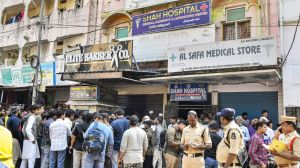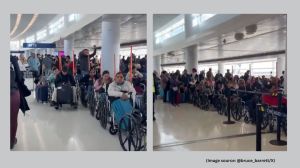Cares own country
Two of the nurses who died in Kolkatas AMRI Hospital fire were from Kerala.
Wanted suitable bridegroom for God-fearing Roman Catholic nurse,28,fair,from Kottayam,working in UK. Financial background not an issue,kondupokum.
Sundays after Sundays,for several decades,the word kondupokum,which translates into will take (the groom) along,in matrimonial advertisements in Kerala dailies defined the unparalleled standing that nurses enjoyed in the state. If there is any single professional force that represents Kerala across the country and abroad,its the states nursing community.
In the sixties and seventies,nurses from Kerala migrated to the US and to countries in the Gulf and Europe. They sent home enough money to inspire others,many from middle-class and lower middle-class homes,to follow them. The stories of these young nurses often had a familiar thread running through them: of girls flying back home to Kerala for hurriedly-fixed marriages,of nurses leaving behind their children in the care of their parents.
The higher educational and professional training among Christians in Kerala,who form 90 per cent of Kerala nurses,may explain the head start that nurses from the state had over others,according to Transcending Boundaries,a 2007 paper on migration among Indian nurses by Sreelekha Nair and Marie Percot.
Prof S Irudaya Rajan of the Centre for Development Studies in
Thiruvananthapuram says Kerala nurses had the first-mover advantage. The migration began in the seventies and peaked in the next two decades. That the early migrant nurses could speak English also stood them in good stead, says Rajan,who has extensively researched international migration.
In the seventies and the eighties,a nurse needed only a relative or a friend in the Gulf or US to migrate. Many nurses had even helped their neighbours get jobs abroad. Many of them went to countries such as Germany and Italy with the help of nuns or priests, says Ammini Narayanan,from Angamaly in Kochi district,who worked as a nurse in Muscat from 1976 to 1989.
***
Keralas nursing dream often takes shape in colleges in Kerala,Tamil Nadu,Karnataka and Andhra Pradesh. In the nineties,when Kerala didn’t have enough nursing colleges,girls from the state travelled to other states in search of a diploma or degree in nursing. Some even paid up to Rs 2 lakh as donation or commission to agents for a seat in a nursing college. After Kerala opened up its education sector for private investment in early 2000 and with easy education loans,the state witnessed a mushrooming of nursing colleges.
But over the years,a slump in the overseas job market has changed fortunes. From the days when thousands of aspiring nurses flocked to nursing colleges,institutes in Kerala are now struggling to fill their seats. That the starting salary in Keralas private hospitals is still stuck below Rs 3,000 a month has dissuaded youngsters from taking up the profession.
According to Professor R Latha,registrar of the Kerala Nurses and Midwives Council,Job openings have come down. This year,10 nursing colleges in Kerala did not get students for the general nursing and midwifery (GNM) diploma course. Two hospitals have abandoned their plans of opening nursing colleges.
Prof Latha says the council office has been getting fewer verification queries from hospitals abroad that seek to recruit nurses from Kerala. Until recently,our office used to get 40 to 50 queries a day from countries such as Australia,Ireland,USA,Bahrain,South Africa and Denmark. Now,we get fewer than 25 calls a day. Between 2000 and 2010,we used to get 75-odd queries a day from Denmark alone, she says.
***
At the Mother College of Nursing,Thrissur,a three-storeyed building painted in the nursing colours of white and blue,almost every student you speak to has her career goals neatly charted: a job anywhere in Kerala to start with,then in any of the major cities outside the state and finally a job abroad.
The institute,attached to Mother Hospital,offers a four-year BSc nursing degree course and takes in 50 students every year. Half the seats are filled under the merit quota from a list allotted by the state government and the rest under a management quota,where students pay a donation fixed by the institute.
The annual tuition fee in private colleges is anywhere between Rs 65,000 and Rs 75,000. Apart from accommodation charges,students end up paying other incidental fees. At the end of the four-year course,a student would have typically put in Rs 4 lakh.
Arun Babu,who got his nursing degree from Mothers a month ago,is worried that hospitals in Kerala have decided to only appoint nurses who come with a years experience. There seems to be no chance for a fresher, says Babu.
Babu had taken a bank loan of Rs 2.6 lakh to join the course after he failed to get into the MBBS course. I had dreamt of a profession in medicine. I have to repay my loan soon. What will I do if nobody gives me a job, he says.
At the Thrissur college,students start their day at 8 a.m.,when they turn up at Mother Hospital for clinical duty,which continues till 1 p.m. Most of the leading and mid-level hospitals in Kerala have nursing colleges attached to them and they usually depend on the free services of the students to run the show.
So the students do everything that’s asked of themwheeling in stretchers and wheel-chairs,making the beds of patients and cleaning the wards.
After the clinical duty,students rush to the classrooms at 2 p.m. for a two-hour theory session. In their fourth year,students are posted in hospital wards for night duty from 10 p.m. to 8 a.m. Some hospitals get students to work for 15-hour shifts.
Students say the routine is demanding and errors come costly. If a student is late by 15 minutes for duty,she is marked absent. For each absence marked,a student has to do three extra rounds of clinical duties at the hospital.
For any other course,there would have been a cut-off point for attendance. But here,they do this to exploit us, says Abdul Jaleel,a fourth-year student.
When my father died,I had to go on leave for a few days. Now,I have cleared my course but I have 97 days of compensatory work to do, says Babu,who completed his course last month.
Dani Rosanto,a fourth-year student,says she knows the job market is not what it used to be,but that hasnt affected her passion for the profession. I have always wanted to be a nurse,ever since I was in school. I studied in a convent school and that influenced my choice, she says.
But these days,Rosanto is worried. Her father,a driver,pays Rs 78,000 as her annual fee and she is worried about not landing a job. If I do not get a job in Kerala,I will be forced to move to Mumbai or Delhi.
She eventually plans to work abroad. My friend had told me about her sister who works as a nurse in the US. That really inspired me, says Rosanto.
For now,Rosanto has a long way to go before she gets there. The syllabus is tough. There are fourth-year students who are yet to clear their first-year papers. Many students look exhausted and some regret having taken up the course.
Mary Anita,a second-year student,joined nursing,inspired by her father and elder brother,both nurses. My brother,who studied in Bangalore,had warned me when I told him of my plan to take up nursing. He warned me about the bad hours and the poor money, says Anita,who scored 91 per cent marks in her class XII.
Divya Das,a second-year student at the nursing college,says its her student loan of Rs 2.5 lakh that sees her through the course. Daughter of a daily wage labourer,Das says the schedules are punishing. We are completely exhausted by the time we come to our classrooms after the seven-hour clinical duty. I sit up till 2 a.m. every night to complete my course work, she says.
Nithin Murali,who has just completed his course,says he joined the college through the management quota after paying a donation of
Rs 80,000. They say nursing is a noble profession. But after completing the course,I now realise that ours is among the worst-paid jobs. Nurses earn about Rs 3,000 a month after working for 10 to 15 hours a day. How will I pay back my bank loan of Rs 3 lakh? he asks.
Muhammed Rashid,son of a telephone booth operator,says he opted for the GNM diploma course after abandoning his degree course midway. When I joined the course,I was made to believe that this is a professional course with a lot of openings in the Gulf. But now,the future looks bleak, says Rashid.
Till her last breath,she didnt desert the patient
Madhuparna Das
For all the blame heaped on the medical staff and doctors of AMRI for allegedly deserting patients in their hour of need,it was a group of nurses from Kerala who risked their lives to rescue a number of patients. Two nurses from the state,P K Vineetha and Remya Rajappan,died in the fire and many were injured.
Like in almost every other hospital in the country,nurses from Kerala were a key part of the nursing workforce at AMRI. According to Jaison Abraham,who works for a city hospital and is now volunteering as a coordinator between the Kerala nurses and their families back home,there are at least 15,000 nurses from the state who work in super-specialty private hospitals in Kolkata. Abraham said AMRI Hospital in Dhakuria has 400 nurses from Kerala,Tagore Heart Research Centre has 950,B M Birla has 250 and Calcutta Medical Research Centre has 400.
Its often better pay that forces the nurses from Kerala to look for jobs outside their state.
Nikhila Thomas,a nurse at AMRI,Dhakuria,says,In super-specialty hospitals,fresh recruits get at least
Rs 9,000. Hospitals in Kerala pay us far less. Thomas,who is from a farming family in Keralas Idukki district,spent more than Rs 3 lakh on her three-year general nursing course in Hyderabad. Thomas,who was at her hostel on the night of the fire,says she rushed to the hospital around 4.30 a.m. and joined her colleagues in the rescue operations.
Sandhya,a 23-year-old nurse at AMRI,was discharged from Medica hospital at EM Bypass in the city on Friday after being treated for injuries sustained in the fire. Sandhyas brother Saineesh had rushed to Kolkata from Kottayam district of Kerala to be with his sister. My sister evacuated three patients all by herself. But she herself got trapped and inhaled a lot of the smoke before she could be rescued.
Manisha P Mathhew,another nurse,recalled how she called her friend Remya who was trapped in the building. I called up Remya and asked her to come out of the building. But she told me that she would not come out till she had evacuated the last patient from the ward. But she couldnt since the patient was on life support. But till her last breath,she did not desert the patient, says Manisha,who is from a farming family in Alleppey district of Kerala.
Two male nurses,Praveen and Tito,are being treated for the injuries they sustained while breaking open the glass windows of bathrooms in the male cardiac unit.
But the nurses say their role in helping the patients hasnt been acknowledged enough. Two of our sisters died and several others were injured and are still undergoing treatment for inhaling toxic fumes. It is sad that newspapers carried pictures of our brother nurses evacuating patients and identified them as the local slum dwellers. It was frustrating, says Rizo Phillip,who along with a senior doctor,evacuated eight of the nine patients admitted in the ICCU on the fourth floor.
Looking back
According to the Kerala Nurses and Midwives Council,the first nursing college in Kerala opened in 1947 at Medical Mission Hospital at Thiruvalla in Pathanamthitta,the district of expatriates. The first government nursing school was set up in 1954,attached to the district government hospital in Thiruvananthapuram. Until 1970,only a few private hospitals in Kerala,such as Lourdes Hospital at Kottiyam in Kollam district,Sacred Heart Hospital in Alappuzha,Jubilee Mission in Thrissur and Little Flower in Ankamaly,had nursing colleges.
The nursing school boom in Kerala came after 2000,when the Congress government led by A K Antony opened up self-financing in colleges to check the flow of students to neighbouring states. Outside Kerala,Mangalore and Bangalore turned into major hubs for nursing education.
Since 1949
82,744 BSc nurses registered
1,27,004 GNM nurses registered
30,767 ANM nurses registered
The Institutes
242 institutes offer GNM diploma,with an annual intake of 30 students
100 institutes offer BSc nursing and each admits 50 students a year
26 institutes offer MSc Nursing
23 offer post-BSc course
16 for Auxiliary Midwife
Nurse course
Most of these institutes are in central Kerala districts of Kottayam,Ernakulam,Thrissur and Pathanamthitta
Elsewhere
Karnataka has 1,090 recognised nursing institutes,with 571 of them conducting GNM and 339 offering BSc courses
In Tamil Nadu,there are 474 recognised colleges,with 212 colleges conducting GNM courses





- 01
- 02
- 03
- 04
- 05


























